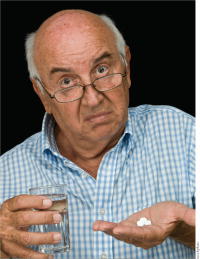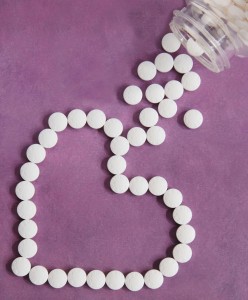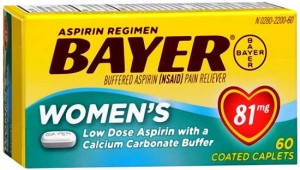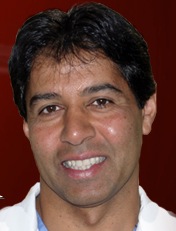Think Twice Before Interrupting Aspirin Therapy
By Khalid Sheihk, MD, MBA // February 12, 2013
February Is Heart Health Month
BREVARD COUNTY • VIERA, FLORIDA–Daily use of aspirin is not only a common, but also a proven therapy for patients who have coronary heart disease (CHD). Now a new study indicates that if heart patients stop taking aspirin for more than one week, their risk of heart attacks, strokes and death increases nearly seven-fold.
The study was conducted in Sweden from 2007-2010 at Stockholm’s largest hospital and is reported in this month’s medical journal, Clinical Gastroenterology and Hepatology. It looked at 118 consecutive patients who were hospitalized and successfully treated for bleeding stomach ulcers. More than 60% of the patients (76) were taking aspirin therapy for known CHD. Since aspirin is known to cause or aggravate ulcers, it was stopped permanently in 47 of the 118 patients. However in 71 patients, aspirin was only temporarily stopped to let the ulcer heal, and re-started either before the patient left the hospital or, on average, one week after the bleeding episode.
Risk Of Heart Attack And Stroke Almost Seven Times Higher If Aspirin Stopped Permanently
The patients were then followed after release from the hospital. Among patients who did not have known CHD, stopping aspirin permanently had no effect on their future risk of CHD events.

However, among the patients who were on aspirin for CHD, the risk of heart attack, stroke and death within the first 6 months after release from the hospital was 6.8-times higher than the group who were left on aspirin. Only 8% of the 71 patients who continued aspirin had a cardiovascular event, compared to 31% of the 47 patients who stopped aspirin permanently. The CHD risk was highest in patients over the age of 65. There was no difference in the risk of recurrent bleeding ulcers among patients who either continued or did not continue aspirin.
The authors of the study point out that a 2010 study from Korea had similar findings. In this study, the risk of recurrent CHD events among heart patients stopping aspirin was 8-fold higher than those who were permitted to continue on aspirin. In this study, this risk became evident much sooner, only 8 weeks following release from the hospital. The Korean study also found that those who continued aspirin had a two-fold higher risk of recurrent bleeding, a finding not supported by the Swedish study.
Aspirin Critical In Treatment Of CHD
Aspirin is a valuable medication in patients with CHD. This includes those who have had a heart attack, stroke, transient ischemic attack (TIA), angina, carotid atherosclerosis, peripheral atherosclerosis, a previous leg bypass, coronary bypass, angioplasty or stent. Aspirin blocks the clumping of platelets inside blood vessels that can lead to an aggravation or recurrence of these problems.

Aspirin was studied in two large cohorts of patients with known CHD, the ISIS-2 trial and the APTC trial. In the former trial, aspirin in patients already having had one heart attack, reduced the risk of a recurrent heart attack by 50% and death by 23%. In the latter trial of patients with stable CHD, aspirin reduced the risk of death by 23%.
Aspirin is also used in patients without known CHD. It is currently recommended for “primary prevention” by the U.S. Preventative Services Task Force at a dose of 81 mg per day for women over the age of 55 years and men over the age of 45 years to reduce the risk of first stroke or heart attack. However, in these patients, the benefits of aspirin are much less, and no study has shown taking aspirin makes patients without known CHD live longer.
Safe Aspirin Dose Individualized To Each Patient
Aspirin is the chemical acetylsalicylic acid, and as such is a chemical irritant to the lining of the stomach. As noted above, it is also a blood thinner. These two effects can be a deadly combination. Aspirin can cause a variety of stomach problems ranging from heartburn to bleeding ulcers, and rarely even fatal hemorrhage. The proper doses of aspirin are the subject of much debate.

Typically, recommended doses of aspirin for CHD patients range from 81 mg to 325 mg per day. The lower the dose, the greater the safety. The proper dose is individualized for each patient based upon an assessment of their medical conditions, other medications they take and their bleeding and stomach risks.
If you are a heart patient, do not stop your aspirin for any reason without first checking with your health care provider. If you have stomach upset or bleeding problems, discuss these with your doctor. In some cases aspirin dosing may need to be changed or temporarily interrupted. While aspirin is an over-the-counter medication, it carries risks and benefits that exceed many prescription medications. Treat it as a serious part of your medication regimen, and forget the old dismissive adage, “…take two aspirin, and call me in the morning…”
For more information, get the book Don’t Let Your Heart Attack!, available on Amazon, Barnes & Noble and iTunes.
ABOUT THE AUTHOR

Dr. Sheikh, a member of Health First Physicians Cardiovascular Specialists, directs a cardiology practice specializing in lipid management and cardiovascular disease prevention, treatment and reversal in Cocoa Beach, Florida. He was a Professor of Cardiology at Duke University before entering private practice, and is currently on the clinical faculty at the University of Central Florida College Of Medicine. Dr. Sheikh, who was recognized by the Consumers’ Research Council of America as one of America’s Top Cardiologists, is board certified in both Internal Medicine and Cardiovascular Diseases, and is a Fellow of the American College of Cardiology. He is also a certified clinical lipid specialist, board certified in adult echocardiography and has completed level I training in cardiac CT imaging. He has served as the principal investigator in over 100 national and international clinical research trials, and authored over 150 scientific abstracts, peer-reviewed journal articles, book chapters and subject reviews.
For more information about Don’t Let Your Heart Attack and Dr. Sheikh’s practice go to SheikhHeartCare.com











